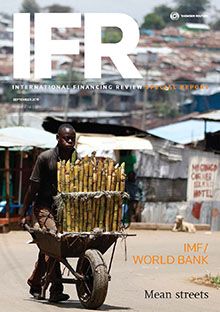Mean Streets: If the IMF were a cop, it would be the righteous Commissioner Gordon, desperately trying to maintain order in Gotham City while waiting for Batman to turn up.
<div class="inline_image inline_image_left image_size_small" data-attachment="296962"> <p class="picture"><img alt="IMF/World Bank 2015" src="/MediaFiles/Browse/de129122-c96a-4dc6-8fc2-42ae8403c1c7"></p> <p class="inline_title"> </p> </div>Since the financial crisis, the odds have seemed overwhelming stacked against the IMF, yet the Fund – like Gordon – has battled on, steadfastly working to rid the metropolis of supervillains.
But if there is one thing this fabled enforcer cannot do, it is to stop the feuds endlessly firing up the gangs that prowl the streets. At every street corner political spats are muscling in on market activity.
Start with the classic victim, Greece, which claimed noisily to have been mugged by the very bodies created to protect the weak, before finally agreeing an €86bn bailout. While one hopes the worst is behind it, the outcome is still hostage to politics as Greeks head to the polls once more. Neighbouring Turkey has also been consumed with political infighting sapping the will of foreign investors. In the Slavic quarter, western sanctions against key Russian corporates are still punishing President Vladimir Putin for his Ukraine policy and stifling the debt markets. Gazprom provided bankers waiting for Russian borrowers to return to the bond markets with some reward, but capital continues to flee.
If Ukraine itself can celebrate some rare good news with a deal to restructure US$18bn of foreign debt, it is probably only because the IMF has itself been playing politics – flexing its own rules to continue backing Kiev.
Political horse-trading is also likely to determine the outcome of China’s efforts to ensure the renminbi joins the IMF’s basket of reserve currencies after depreciation and market turmoil over the summer.
India demonstrates how all too often politics can disarm markets. The election of Narendra Modi last year raised high hopes of a new dawn for debt markets, yet frustration at foot-dragging has set in. Political turmoil over corruption allegations and a weak ringgit have also hampered sukuk issuance from Malaysia. While the fallout from the Petrobras scandal has left Brazil fighting to retain its investment-grade status.
These machinations may reflect something deeper, as emerging markets and currencies show signs of contraction that threaten to erode gains made after the big boys took a bruising in the financial rumble. They may also reflect what happens when the big guys recover and start throwing their weight around ¬– emerging markets now know a US rate hike is coming and are worrying about illiquidity again as investors prepare to scramble for the nearest bolthole.
They have good reason to be jumpy. Someone has put a contract out on EM corporate debt. Bond sales have hit the sidewalk in Eastern Europe, Africa and Latin America.
Nonetheless, there’s always one wise guy who benefits from the misfortunes of others. Asia has been a big winner in recent quarters, now controlling half the EM debt market. Offshore G3 markets have seen record issuance volume, even if debt-addicted China is risking an overdose.
Mindful how his role has grown since the crisis, Commissioner Gordon is being forced to reconsider his traditional policing style of tough fiscal justice.
Over-extension to Greece and its July default have raised important questions about the IMF’s modus operandi and “super-senior” creditor status and the Fund is set to lead the debate on carbon pricing at the forthcoming Paris climate conference.
Whatever the rap, Gordon’s efforts to bring law and order to Gotham have not been entirely in vain.
Once the bad kids on the block, the Andean economies appear to have internalised the commissioner’s righteous message about fiscal responsibility and made genuine macroeconomic strides.
The caped crusader would be proud. If he ever turns up, that is.
To see the digital version of this report, please click here
To purchase printed copies or a PDF of this report, please email gloria.balbastro@thomsonreuters.com
<object id="__symantecPKIClientMessenger" style="display: none;"></object>
